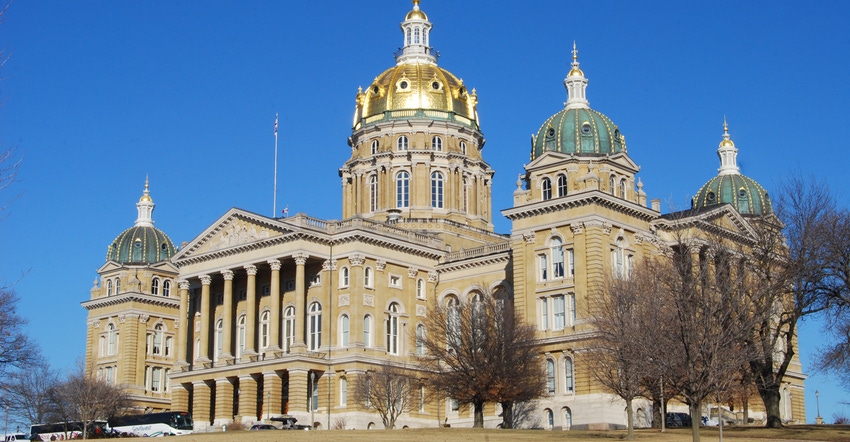January 29, 2018

The Iowa Legislature kicked off the 2018 legislative session Jan. 8 with several key issues on the forefront. Water quality (and how to fund it) was at the top of the list. Gov. Kim Reynolds, in her first Condition of the State address, said she hoped a water quality bill would be the first piece of legislation she signed as governor. She got her wish.
The GOP-led Legislature acted quickly and pushed for Iowa House members to get behind the water quality bill the state Senate passed last session. On Jan. 23, lawmakers passed legislation that will provide nearly $300 million for water quality efforts in Iowa over the next 12 years. These state cost-share dollars will be matched by federal, private, farmer and landowner investments being made for conservation practices and projects.
Other bills introduced by the Legislature cover these topics:
• Livestock regulation. Several bills relating to livestock regulation have been introduced by Sen. David Johnson, including Senate Files 2006-09, 2011, 2018-19 and 2036, relating to an array of issues involving confinement animal feeding operations, including siting, and proposing moratoriums for certain proposed sites and Master Matrix issues.
Some similar bills were introduced last session that didn’t survive the legislative funnel deadlines. We will follow up on this important issue more in-depth in next month’s column, as information becomes available.
• Tax reform. Reynolds wants to modernize Iowa's tax code in part by reducing individual taxes, a proposal she'll push amid budget constraints. She also wants to avoid increasing state tax revenue following changes to federal regulations. Of course, an issue of utmost importance to farmers is Section 179 coupling at the state level, which we will continue to monitor.
• This year’s timeline. To keep on pace to finish the session in 100 days (which hasn’t happened in the past several years), the Legislature sets two self-imposed “funnel” deadlines. According to the 2018 Iowa Legislative Session timetable (which is subject to change), there are two funnel deadlines. The first is Feb. 16, when Senate bills must be reported out of Senate committees and House bills must be reported out of House committees. The second is March 16. The 2018 session is currently scheduled to end on April 17.
In short, any bill that is introduced and doesn’t pass in its committee of origin prior to the first funnel deadline is deemed “dead,” thus limiting the number of bills the Legislature has to deal with in the session. It’s important to note that appropriations, ways and means, and oversight bills aren’t subject to the funnel deadlines. Policy bills that contain spending or taxing provisions that passed the policy committees then move on to appropriation, or ways and means committee for review.
In next month’s Legal Issues column, we’ll continue to provide updates on bills introduced this session, their status, and potential effect on farms and farm families. Will the Legislature debate other water quality issues? What impact will budget issues have on family farmers and agriculture this session? Stay tuned for new developments and answers.
For more information or an update on any of the bills mentioned here, visit legis.iowa.gov.
Herbold-Swalwell is an attorney with Brick-Gentry PC in Des Moines.
Poll: 69% back sales tax hike for water quality
Nearly 70% of Iowans support a small increase in the state sales tax to improve water quality in lakes, rivers and streams. A poll of 500 Iowans shows 69% support raising the sales tax three-eighths of 1 cent to pay for cleaner water, trails and parks.
The poll was commissioned by a coalition supporting the sales tax. Members include the Iowa Soybean Association, Ducks Unlimited, Iowa Natural Heritage Foundation, Pheasants Forever and the Nature Conservancy in Iowa.
Support for the sales tax climbed from 63% in 2013 to 69% now. “Iowans want clean water, productive soil and increased outdoor recreation opportunities,” says Joe McGovern, president of Iowa Natural Heritage. “In 2010, 63% of Iowa voters approved a constitutional amendment to create a trust fund to hold the money needed to improve Iowa’s natural resources. But so far, the Iowa Legislature hasn’t provided the money for the fund.”
The coalition says strong statewide support for the sales tax hike is driven by the belief that the quality of Iowa’s waterways is a serious problem needing immediate attention. The sales tax increase would generate an estimated $187.5 million annually for the trust fund.
The coalition says 52% of Iowa voters who identify as conservative Republicans support the tax, as do 64% of those who make a living farming. Kirk Leeds, CEO of the Iowa Soybean Association, says keeping soil and nutrients on fields and out of streams helps farmers. “Productive soils yield a prosperous Iowa,” he says. “Improved water quality through a watershed approach is critical to protect that productivity, and the sales tax is critical to sustainable funding.”
The coalition says other groups supporting the tax include 83% of suburban voters, 73% of women voters, and 71% of voters age 65 or older.
Source: Iowa Water & Land Legacy Coalition
About the Author(s)
You May Also Like






